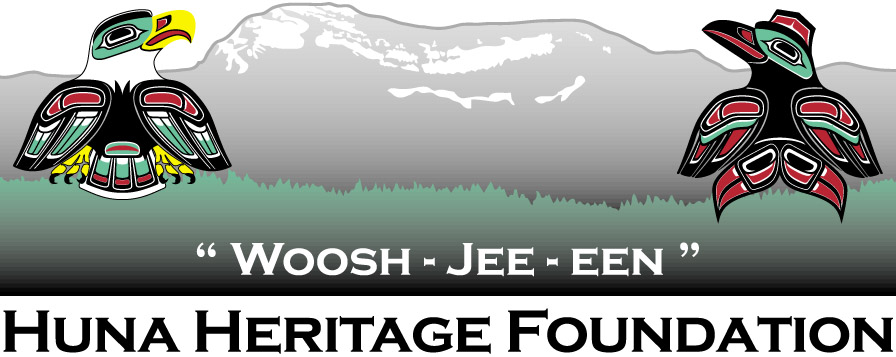WHO WE ARE
AUDIENCE
Intended audiences for the HHF digital collections include:
• Xúnaa Kaawu, people with indigenous Hoonah lineage
• Huna Totem shareholders & descendants
• Hoonah Community members, people who reside in Hoonah or from Hoonah
• Primary, secondary and post-secondary students and instructors
• General public
WHY WE DIGITIZE
HHF recognizes that the materials held within the Library & Archives represent a collective memory for the Xúna Kaawu and Hoonah community. As stewards of cultural and historical record we find inestimable value in digitizing our collection for the purposes of:
• Access – Building connections between the past, present and future. Connecting users, regardless of location, to materials representing the history and culture of Hoonah.
• Preservation – Preserving image, audio and video representation of our way of life. The conservation, care and protection of rare and fragile materials that hold and represent the stories of those that came before us so that we may keep them alive and pass them on. In addition, we will care for physical and digital items before, during, and after the digitization process.
• Education – Current and future generations will have increased access to historical and cultural materials that will enhance their understanding of Huna Tlingit culture, language and history.
WHAT WE DIGITIZE
The HHF Digital Archives is a collecting archives which gathers historical and cultural materials relating to the Hoonah people and community for the purposes of education and enjoyment of current and future generations. As such, the following selection criteria are applied:
• Alignment with digitization purpose statement and HHF missions
• Historical and/or cultural significance of material
• Uniqueness and/or rarity of the material (physical object and/or information)
• High audience interest and demand for the material, including suggestions from the community and collection committee
• Clear copyright and permissions status
• Restricted physical access to the material due to its condition, value, vulnerability or location
• Adding value through providing online access, such as complementing other collection material or increasing educational interest in relatively unknown material
• Material readily available elsewhere or of poor quality (ie, low resolution or content not aligned with our scope) may be respectfully declined
HOW WE DIGITIZE
HHF adheres to tribal, national and international standards and practices for digital capture, metadata, storage, preservation and access. HHF’s digitization practices are guided by principles that take into account access and preservation considerations, as well as cultural protocol. Most digitization of materials is done by HHF staff, however some digitization outsourcing may take place due to the nature of the project and the availability of resources. Final decisions for projects to be undertaken will be based on technical feasibility, staff time and the advice of the Collection Committee.
DIGITAL ARCHIVE INFRASTRUCTURE
The HHF Digital Archive uses the Mukurtu Content Management System (CMS). Mukurtu (MOOK-oo-too) CMS is a grassroots, indigenous community driven and customizable site development system that allows for us to draw upon our own cultural protocols to direct the site and set our own access levels. For more information on Mukurtu CMS please visit murkurtu.org
COPYRIGHT STATUS OF MATERIALS
As a steward of historical and cultural record, HHF takes seriously their commitment to complying with and adhering to all legal, ethical and cultural rights, permissions, protocols and restrictions while making these historical and cultural materials available for cultural knowledge development, learning and educational purposes. HHF makes digital collections accessible in the following situations:
• They are in the public domain
• The rights are owned by HHF
• HHF has permission to make them accessible
• We make them accessible for educational purposes as a legal fair use, or
• There are no known restrictions on use
Owing to disrupted histories around the documentation of these collections, we may not always have the full information about the copyright holder of works in our collection. We want to be able to share these valuable materials responsibly as they are important connectors to our history and cultural heritage. The Huna Heritage Foundation policy is to make these materials available to the extent possible. If you have more information about an item, or can identify a copyright holder, please contact the HHF Library and Archives.
Traditional Knowledge (TK) Labels represent an additional mechanism that HHF utilizes on the Mukurtu site to educate users on the appropriate cultural, ethical and legal uses of digitized materials. TK Labels support our local cultural protocols and help to address concerns with circulation of materials as well as Hoonah community specific restrictions for access and use.
ACCESS TO DIGITIZED MATERIALS
HHF strives to provide maximum access to digital collections while protecting the cultural integrity of the Xunaa Kawuu. As such, our Digital Collections may have legal, institutional, family or clan imposed restrictions to access some or parts of the collections. Much of the digital collection is available to the general public, however due to the possible stated restrictions, some content may require access determined through a registered account. Our collection committee and Board of Trustees will help HHF determine restrictions on access. Anyone can request an account and an administrator will respond to the request with instructions.
HUNA HERITAGE FOUNDATION CONTACT INFORMATION
Website: https://www.hunaheritage.org/
Hoonah Office: P.O. Box 275, Hoonah, Alaska 99829 • 907-789-8582 • 306 Harbor Drive Juneau Office: 9301 Glacier Highway, #210, Juneau, Alaska 99801 • 907-789-8581